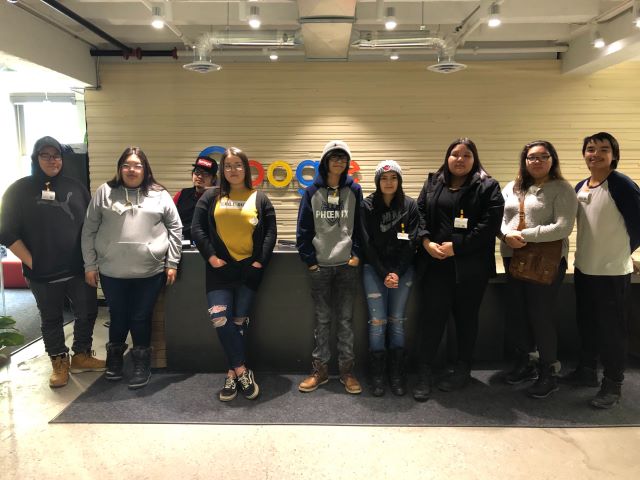It can’t be avoided: technology is transforming every facet of our lives. And the rate of this change will only get faster.
That fact is the driving force behind the Montreal Digital Spring cafés – a series that aims to connect youth with new technology in order to spread technological literacy.
“We live and die offline, but in between we will be online,” observed Digital Spring team member Ariane-Li Simard-Côté. “The digital cafés give access to technologies that the youth may never have had a chance to interact with and then start a conversation about how we should behave online and drive the future of these technologies.”
On February 25, a digital café hosted at Google’s Montreal offices welcomed teens from Algonquin, Innu and Cree communities.

James Esau, a Cree youth from Waskaganish, drove down with his grandfather to participate. He said the event was eye-opening.
“Where I come from, we don’t have that kind of technology,” explained Esau.
The two-day event allowed youth to interact with drones, 3D printers, augmented and virtual reality, and introduced them to the logic behind coding.
When asked about his favourite part of the café, Esau exclaimed, “VR, bro!”
“The goal of the café is to bridge gaps and open up new worlds for the youth who participate,” explained Simard-Côté. “It’s a path and connection for those interested in becoming part of the digital economy.”
And the prospects are promising. It’s estimated that Quebec will need 45,000 new information technology workers by 2021. By 2023, the digital economy across the country will require more than 2 million workers and it’s believed that 85% of the jobs that will exist in 2030 have yet to be invented.
“It was the first time I’ve really thought about a career, but I definitely could see myself working in VR,” expressed Esau. “I wish they had that for [the video game] Call of Duty. Like the haptic VR suit in the movie, Ready Player One.”
And while Simard-Côté acknowledged the difficulty for someone from a small community with limited access to certain technology and who wants to find work in the digital economy, she insisted it’s all relative.
“For my job I’ve traveled to hubs of the technological revolution like Silicon Valley and Shanghai. When you go there, Montreal feels tiny,” insisted Simard-Côté. “It’s a question of perspective. When you want something bad enough you have the opportunity to open up a trail for your peers.”
Esau echoed the sentiment. “I’m going to make it happen no matter what,” he insisted. And when the Nation told him he may have to be the one to develop the technology seen in Ready Player One, he replied, “Let’s do it!”
“Coming down was pretty great – having fun in the city and seeing other Natives was really cool,” continued Esau. “But messing around with technology, it was the first time I experienced that.”
Ironically, the highlight for both Simard-Côté and Esau wasn’t the technology. It was about the people.
“The potential for technology is infinite,” said Simard-Côté. “For me the best part about working with technology and youth is we get to share our passions and see how technology can enhance it. One of the girls was into drawing and we spent the afternoon making 3D models and printing them. It’s like opening a door and then they have the potential to take it as far as they want to take it.”





